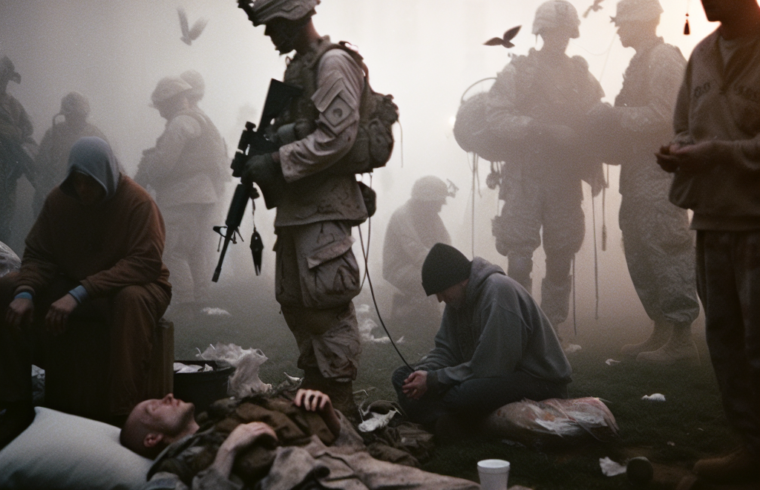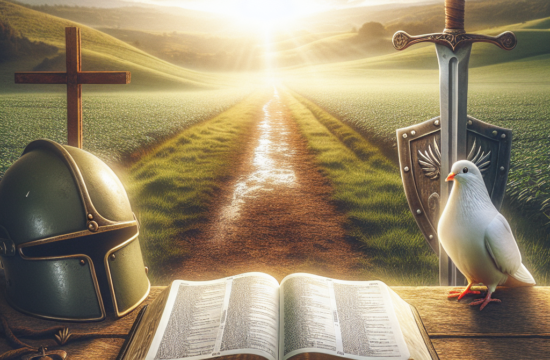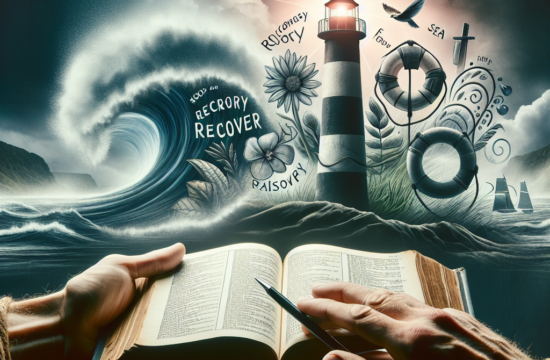==> Thank you for reading this post! Click Here If you are looking for support and Victory over PTSD.
Understanding PTSD and Moral Injury
Defining PTSD in Veterans
As I’ve come to learn, PTSD, or Post-Traumatic Stress Disorder, is more than just a buzzword. It’s a complex condition that many veterans face when returning from service. It stems from experiencing or witnessing traumatic events, and it’s not just about having bad memories. It can manifest in various ways, such as anxiety, depression, and even substance abuse.
In my experience, sitting down with veterans, I’ve heard many describe their PTSD symptoms as feeling like they’re stuck in a loop; they relive events, feeling all the fear and helplessness as if they were happening in real-time. This can make everyday life feel almost intolerable.
Understanding this aspect is crucial. It sets the stage for compassion and support from friends, family, and the community. Educating ourselves about PTSD not only helps us grasp the veterans’ struggles but also enlightens us on how to help in real, tangible ways.
Moral Injury Defined
Moral injury is a term I’ve found many people confuse with PTSD, but they are quite different. Moral injury happens when someone feels they’ve violated their moral beliefs while serving. Imagine facing a situation where you have to make a choice that goes against everything you believe in. Many veterans grapple with the weight of those choices, which can be just as burdensome as PTSD symptoms.
This internal conflict can lead to deep feelings of shame, guilt, and alienation. It’s heartbreaking to hear veterans talk about the choices they made or the orders they received that contradicted their ethical standards. This is a heavy load to carry and often leads to an indescribable sense of loss.
Understanding moral injury has been a game-changer for many. Realizing that this type of emotional wound exists can be the first step towards healing. It brings awareness not just to their struggles, but also helps their families and friends comprehend what they’re facing.
The Intersection of PTSD and Moral Injury
You might be wondering how PTSD and moral injury intertwine. In my conversations with veterans, I’ve noticed that these two issues are intricately linked. A traumatic event can lead to moral injury, and the ensuing guilt from that experience can exacerbate PTSD symptoms. It’s like a vicious cycle that keeps pulling them down.
Sometimes, veterans find themselves trying to reconcile their actions in combat with their personal values. This isn’t just a moment of regret; it can spiral into deeper issues, such as depression and an overwhelming sense of isolation from those who’ve never walked in their shoes.
Recognizing that both PTSD and moral injury often coexist can open up pathways for comprehensive treatment and healing. It isn’t just about addressing one aspect; it’s about viewing the veteran’s experience holistically. Understanding this has helped me advocate for better support services for those who’ve sacrificed so much.
Signs and Symptoms to Watch For
Recognizing PTSD Symptoms
As I gathered more insights on PTSD, I realized that recognizing the symptoms early can make all the difference. Common signs include flashbacks, hypervigilance, and emotional numbness. I recall meeting a veteran who shared that just hearing fireworks could send him into a panic because he was reminded of combat.
It’s essential for friends and family to learn these symptoms. The more we’re aware, the better equipped we are to help our loved ones or fellow veterans. When someone is struggling, a simple act of showing understanding can mean the world.
By fostering an environment where veterans feel safe to voice their struggles is pivotal. It’s not always easy, but being vigilant about these signs is the first step toward creating that supportive space.
Identifying Moral Injury Symptoms
Moral injury tends to fly under the radar, so I often encourage people to learn about its symptoms. Feelings of guilt, shame, and self-blame can surface in various ways. For instance, I once spoke with a veteran who felt immense regret for surviving when others didn’t, and this had a profound effect on his daily life.
It’s crucial to identify these feelings as not just “part of the job.” They are valid responses to impossible situations. Helping our veterans articulate their pain can often serve as a first step toward their recovery.
Acknowledging that suffering from moral injury is just as important as recognizing PTSD can aid in developing effective treatment plans. This dual awareness fosters understanding and proactive support within our communities.
Creating Connections and Encouraging Dialogue
We must break the silence surrounding both PTSD and moral injury. In my experience, facilitating open conversations can significantly improve veterans’ mental health. I’ve watched it transform relationships and build trust, which is critical in their recovery.
Setting up support groups or community programs is a fantastic way to bring veterans together. It gives them a platform to share, relate, and heal. When veterans hear others sharing their stories, it can be incredibly validating and can help lift some of the burdens they carry inside.
Get Support and Help with Recovery! Visit us for more Information and Support
Creating these connections doesn’t just help veterans—it educates the community as well. By enhancing the understanding of what these warriors go through, we can foster a more supportive world that is committed to healing and moving forward.
Healing and Moving Forward
Therapeutic Approaches
When it comes to healing, there’s a variety of paths one can take. I’ve learned about therapies that specifically target PTSD and moral injury, such as Cognitive Behavioral Therapy (CBT), which helps veterans reframe their thoughts and feelings. Veterans I’ve spoken to have shared how this method has helped them gradually regain control over their lives.
Other approaches like Eye Movement Desensitization and Reprocessing (EMDR) have also shown promise. These methods can facilitate the processing of traumatic memories while addressing moral conflicts, helping veterans find closure.
Ultimately, no single approach fits all; it’s about finding what resonates with each individual. Supporting veterans to explore different therapeutic avenues can foster hope and progress in their journeys to healing.
Community and Family Support
One thing I’ve come to realize in this journey is that community plays a vital role. When veterans feel supported by their community and family, the healing process is significantly enhanced. It’s all about creating a sense of belonging and understanding.
Encouraging family involvement in therapy and open communication can build bridges that may otherwise remain broken. I’ve seen how family support can reignite positivity and provide comfort to many veterans.
Creating events or programs where families can learn together about trauma and coping mechanisms can create a network of love and understanding. Together, they can navigate through this challenging path towards mental wellness.
Finding Purpose Again
Somewhere along this journey, many veterans will seek to rediscover a sense of purpose after combat. Whether it’s through volunteer work, mentorship, or engaging in new hobbies, finding that new direction can be incredibly healing. I’ve seen veterans blossom as they connect with their communities and contribute positively.
This new chapter doesn’t erase the past but rather builds on it. Many veterans find comfort in helping others who have faced similar challenges. They embody resilience, and when you witness that kind of strength, it’s truly inspiring.
As we support our veterans in this endeavor, we foster a renewed sense of meaning in their lives. It not only helps them heal but enriches our communities as a whole.
Conclusion
Navigating the untold truth about PTSD and moral injury is a crucial part of understanding the experiences of our veterans. By educating ourselves, encouraging open dialogue, and promoting empathy, we can become allies in their healing journeys. Together, we can transform pain into progress and create a more supportive environment for these remarkable individuals.
Frequently Asked Questions
1. What is the difference between PTSD and moral injury?
PTSD results from experiencing traumatic events, while moral injury arises from actions or decisions that conflict with personal moral beliefs during service.
2. How can family and friends support veterans dealing with these issues?
Being open and understanding, encouraging professional help, and participating in support groups can provide essential support.
3. Are there effective therapies for treating these conditions?
Yes, therapies like Cognitive Behavioral Therapy (CBT) and Eye Movement Desensitization and Reprocessing (EMDR) have proven effective for many veterans.
4. How can communities help veterans with PTSD and moral injury?
Communities can foster supportive environments by organizing events, creating awareness programs, and facilitating discussions about these issues.
5. Can finding a new purpose aid in the healing process?
Absolutely! Engaging in volunteer work or mentorship can provide veterans with a sense of direction, helping them find fulfillment, which is integral to healing.













